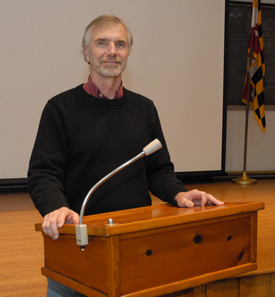Cambridge, Md. (February 24, 2011) – The Chesapeake Bay and its rivers are the lifeblood of the Eastern Shore, defining the region like no other water body in the world. While many easily recognize the natural beauty Bay country offers, the Horn Point Laboratory is launching a new community program designed to make the science of the Chesapeake Bay as accessible as its beauty.
 From March 17 through April 28, Horn Point Laboratory researchers will offer free, weekly talks about the science behind Chesapeake Bay. The thirty-minute talks will not only shed light into the mysteries of the Bay, but also highlight the Horn Point programs working to improve the health of the Bay and its aquatic life. Questions and participation by the audience will be encouraged.
From March 17 through April 28, Horn Point Laboratory researchers will offer free, weekly talks about the science behind Chesapeake Bay. The thirty-minute talks will not only shed light into the mysteries of the Bay, but also highlight the Horn Point programs working to improve the health of the Bay and its aquatic life. Questions and participation by the audience will be encouraged.
“Bay 101 – Science of the Chesapeake for Non-Scientists” will be held Thursdays at 3:30 p.m. in the Aquaculture and Restoration Ecology Laboratory (AREL) Lecture Hall at the Horn Point Laboratory.
Sessions include:
March 17: “Research and Education Programs at the Horn Point Laboratory” - Mike Roman, Laboratory Director
March 24: “History of Land Use and Water Quality in the Choptank Basin” - Tom Fisher
March 31: “Bay Grasses: Why We Should and How We Bring Them Back” - Laura Murray
April 7: “Why Do We Need More Oysters In Chesapeake Bay?” - Roger Newell
April 14: “Sea Level Rise and Marsh Loss in the Blackwater Refuge” - Court Stevenson
April 21: “Oyster Restoration and the Horn Point Hatchery” - Don “Mutt” Meritt
April 28: “How an Estuary Works” - Bill Boicourt
To register, visit www.umces.edu/hpl/Bay101 or contact HPL Volunteer Coordinator Linda Starling at 410-221-8381 or starling@umces.edu.
The Horn Point Laboratory is part of the University of Maryland Center for Environmental Science, the University System of Maryland’s environmental research institution. UMCES researchers are helping improve our scientific understanding of Maryland, the region and the world through five research centers – Chesapeake Biological Laboratory in Solomons, Appalachian Laboratory in Frostburg, Horn Point Laboratory in Cambridge, Institute of Marine and Environmental Technology in Baltimore, and the Maryland Sea Grant College in College Park.
# # #
Media Contact: Linda Starling, 410-221-8381
